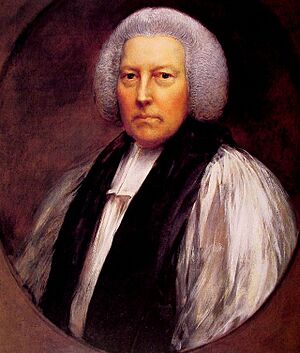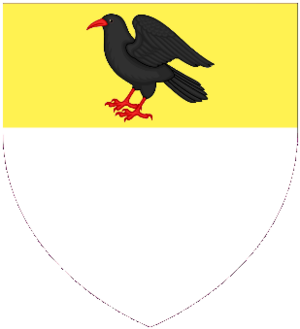Richard Hurd (bishop) facts for kids
Quick facts for kids The Right Reverend Richard Hurd |
|
|---|---|
| Bishop of Lichfield and Coventry and Worcester | |

Bishop Hurd, as painted by Thomas Gainsborough.
|
|
| Personal details | |
| Born | 1720 Congreve, Penkridge, Staffordshire |
| Died | 28 May 1808 (aged 88) Hartlebury Castle, Worcestershire |
| Buried | Hartlebury churchyard |
| Denomination | Church of England |
| Parents | John Hurd (1685–1755) and Hannah Hurd (c. 1685–1773). |
| Alma mater | Emmanuel |
Richard Hurd (born January 13, 1720 – died May 28, 1808) was an important English church leader and writer. He became a bishop of Worcester.
Contents
Early Life and Education
Richard Hurd was born in a small village called Congreve. This village is in the area of Penkridge, Staffordshire. His father was a farmer. Richard went to Brewood Grammar School for his early education. After that, he studied at Emmanuel College, Cambridge.
In 1739, he earned his first degree, a Bachelor of Arts (B.A.). By 1742, he completed his Master of Arts (M.A.). He also became a fellow at his college, which meant he was a senior member of the university. In the same year, he became a deacon in the church. He briefly worked in a parish in Norfolk. However, he soon returned to Cambridge. He became a priest in 1744.
Early Writings and Friendships
In 1748, Richard Hurd wrote a book called Remarks on an Enquiry into the Rejection of Christian Miracles by the Heathens. He also prepared special editions of works by the Roman poet Horace. These editions were so good that even the famous historian Edward Gibbon praised them.
One of Hurd's prefaces in 1749 led to a strong friendship. He became close with William Warburton, another important church leader. Thanks to Warburton, Hurd was chosen to preach at Whitehall in London in 1750. Later, in 1765, he became a preacher at Lincoln's Inn. This was a famous place for lawyers. In 1767, he was made an archdeacon of Gloucester. This is a senior role in the church.
Church Leadership and Royal Connections
In 1768, Richard Hurd earned his Doctor of Divinity (D.D.) degree from Cambridge. He also gave a series of important talks at Lincoln's Inn. These talks were later published as An Introduction to the Study of the Prophecies concerning the Christian Church.
His career continued to advance. In 1774, he became the bishop of Lichfield and Coventry. Just two years later, he was chosen for a very special role. He became the tutor to the future king, the Prince of Wales, and his brother, the Duke of York.
In 1781, he was moved to the more important position of bishop of Worcester. He also became the Clerk of the Closet. This was a personal advisor role to the King. He held both of these important jobs until he died.
Life at Hartlebury Castle
Bishop Hurd mostly lived at Hartlebury Castle. This was the official home for the Bishop of Worcester. He built a wonderful library there. He even moved the book collections of famous writers Alexander Pope and William Warburton into his new library. He bought Warburton's books after his friend passed away.
Richard Hurd was very well-liked by the royal family. In 1783, the King asked him to become the Archbishop of Canterbury. This is the most senior position in the Church of England. However, Hurd politely refused. He felt the job was too big for his personality and skills. He was known as "The Beauty of Holiness" because of his good character.
He passed away on May 28, 1808. He was not married. A memorial for him can be found in Worcester Cathedral. He left his large library to the future bishops of Worcester. This collection of books is still at Hartlebury Castle today.
Key Works and Contributions
Richard Hurd's book Letters on Chivalry and Romance (1762) is still interesting today. It was important in starting the romantic movement in literature. This book was a follow-up to his earlier work, Moral and Political Dialogues (1759). He also wrote two other dialogues in 1763 about the benefits of foreign travel.
Hurd was a strong supporter of his friend William Warburton. He wrote two books defending Warburton's ideas. These were On the Delicacy of Friendship (1755) and a Letter (1764).
He also edited the collected Works of William Warburton. He prepared the Select Works (1772) of the poet Abraham Cowley. Hurd also gathered materials for a large edition of the works of Joseph Addison, which was published after Hurd's death in 1811. His own collected works were also published in 1811.
 | Delilah Pierce |
 | Gordon Parks |
 | Augusta Savage |
 | Charles Ethan Porter |


